May 20, 2021
Dubai Is Building A Smarter Food System With New Food Tech Valley
Editor’s note: The following information is derived from an interview Agritecture conducted with Her Excellency Mariam Bint Mohammed Saeed Hareb Almheiri, Minister of State for Food and Water Security.
Dubai, the city of gold. A beacon of innovation and design for the modern world. This city has been gaining international attention over the past two decades because of its stunning transformation from a Gulf port to a world-famous tourist destination and business crossroad. In the midst of its rapid development, even as Dubai ranks as one of the richest cities in the world, one of the biggest challenges it faces is food insecurity.
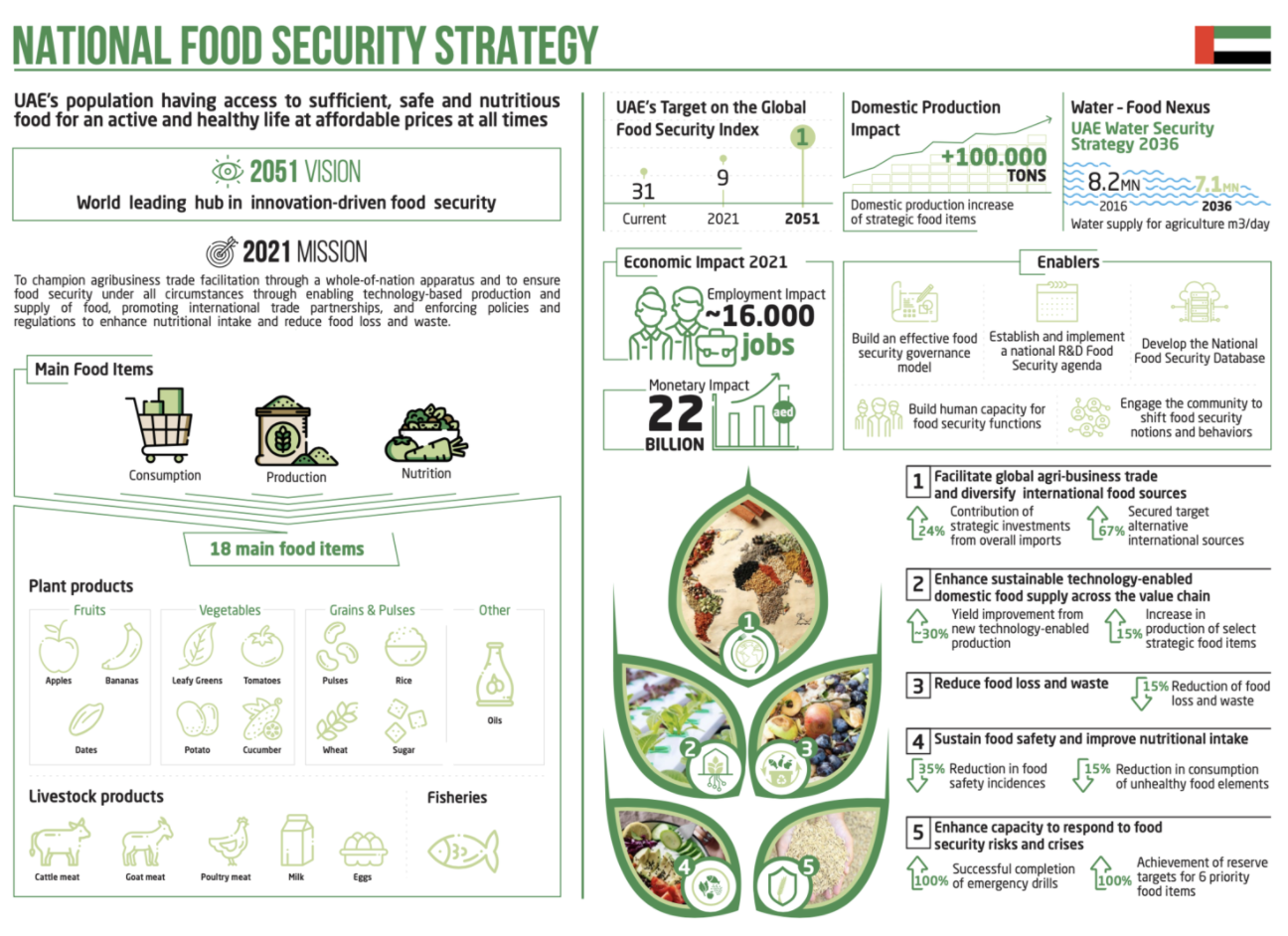
Image of the National Food Security Strategy sourced from the Office of Food & Water Security
The UAE is primarily dependent on food imports, but it is trying to sustainably transform its local food systems. In 2019 the UAE food trade value (imports, exports, and re-exports), amounted to 24.7 Billion USD, cementing the UAE as a regional hub for food trade.
Her Excellency Mariam Bint Mohammed Saeed Hareb Almheiri, Minister of State for Food and Water Security, comments that “with respect to the National Food Security Strategy, its implementation prior to the virus outbreak allowed us to build a high degree of resilience that has been instrumental in enabling us to weather the pandemic.”
In line with Ryerson University’s definition of food security revolving around the 5 A’s of availability, accessibility, adequacy, acceptability, and agency, Her Excellency comments that “the key pillars in the UAE’s strategy that have helped us through the crisis include building strategic reserves of staple food items, establishing wide diversified sources of food imports to create more links in our global food supply chains, and enhancing our degree of self-sufficiency through encouraging innovative, technology-enabled food production methods underpinned by sustainability.”
Working Towards A Change
In regards to Dubai’s rapidly changing agricultural landscape, Agritecture’s Founder & CEO, Henry Gordon-Smith, adds that “the UAE has the right conditions to be the global leader in commercial urban agriculture, especially in the utilization of controlled environment agriculture technologies. Despite this, the challenge ahead for the UAE is significant and will require, above all, fostering a culture of AgTech amongst youth, and creating viable career pathways for them.”
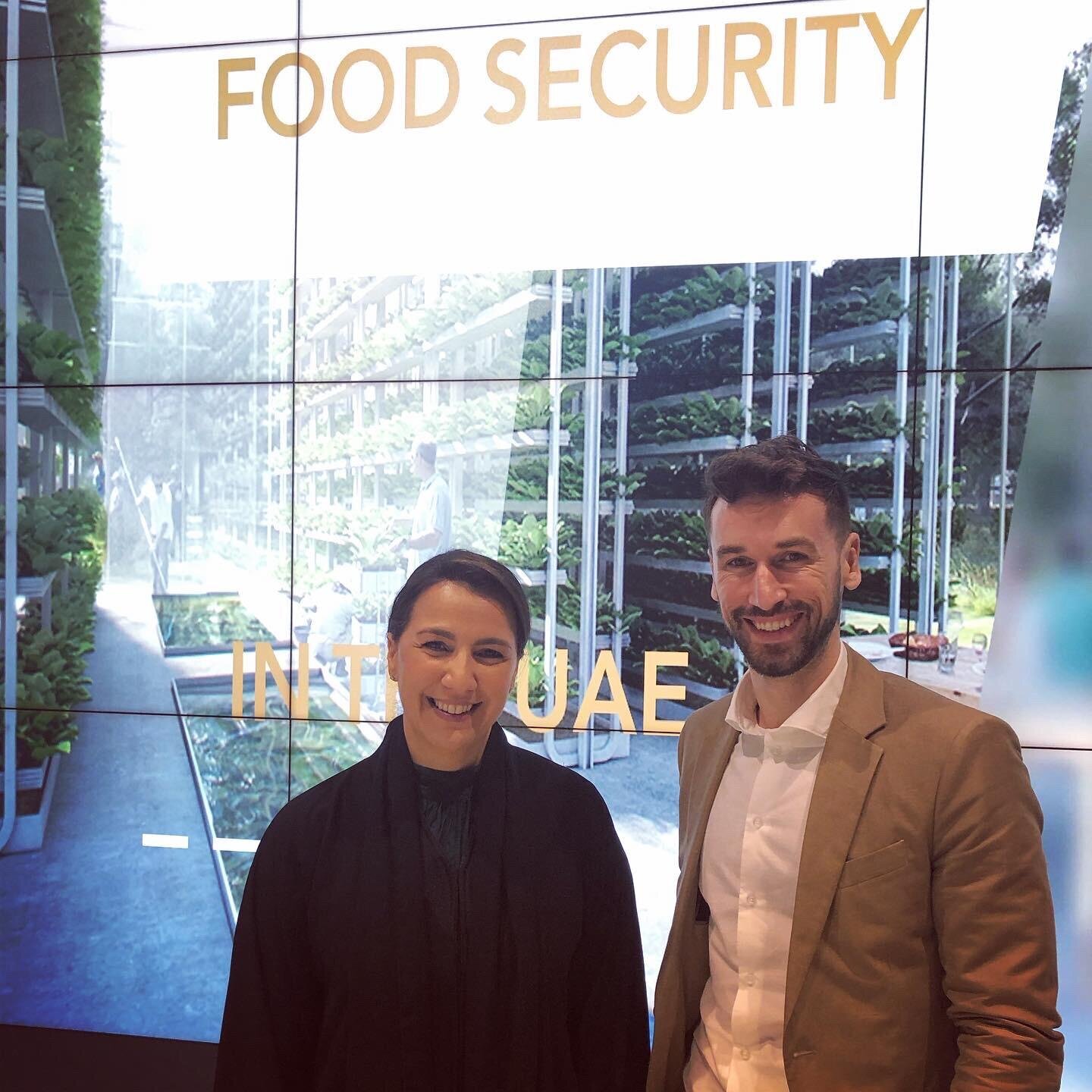
Image of Her Excellency Mariam Bint Mohammed Saeed Hareb Almheiri, Minister of State for Food and Water Security, and Henry Gordon-Smith, Agritecture’s Founder & CEO, at the Dubai Food Tech Valley workshop.
With support from the Government, according to the Ministry of Climate Change and Environment’s 2019 figures, the UAE has more than 177 advanced farms that use modern agricultural technologies and hydroponics, and over 100 entities that implement organic farming across the UAE. Slowly but surely, Dubai is changing the agricultural landscape and making its mark by enabling food production in a desert. This range of facilities not only allow for locally sourced produce and a reduced reliance on imports, they also support agricultural knowledge in the region.
Agritecture is similarly enabling this change in the GCC-MENA region for the past 10 years. Henry Gordon-Smith shares that “we have been advising clients in the GCC since 2014 including vertical farms, greenhouses, and government agencies. One of our clients is building a CEA facility in Saudi Arabia, and another is looking for a site for its vertical farming plans in the UAE. We are also helping investors in the region through Industry Analysis, Due Diligence, and Research services.”
Bringing In A New Decade Of Agricultural Innovation
On May 1st, 2021, His Highness Sheikh Mohammed bin Rashid Al Maktoum, the Vice President and Prime Minister of the United Arab Emirates, and ruler of the Emirate of Dubai, tweeted:
The UAE's food trade exceeds AED100 billion annually. Our country is a global food logistics hub, and we will work to create a nurturing environment for agribusinesses to develop new farming technologies and enhance our future food security. pic.twitter.com/0H9MfFcc0B
— HH Sheikh Mohammed (@HHShkMohd) May 1, 2021
Her Excellency Mariam shares that with “a partnership between the Food and Water Security Office and the real estate developer Wasl Properties, the Food Tech Valley will be an integrated modern city that will serve as a hub for future clean tech-based food and agricultural products, in the process supporting a diversified knowledge-based economy and achieving the objectives of the National Food Security Strategy 2051.”
Her Excellency highlights how “the Food Tech Valley will be home to four main clusters: agricultural technology and engineering, a food innovation centre, R&D facilities, and an advanced smart food logistics hub. It will accelerate self-sufficiency in fresh food produce and reduce wastage of resources by applying research and modern technologies to the latest agricultural techniques.” She adds that launching it “in the country’s 50th year is a fitting statement of intent for how the UAE intends to become a global leader in the sustainable food production systems of the future.”
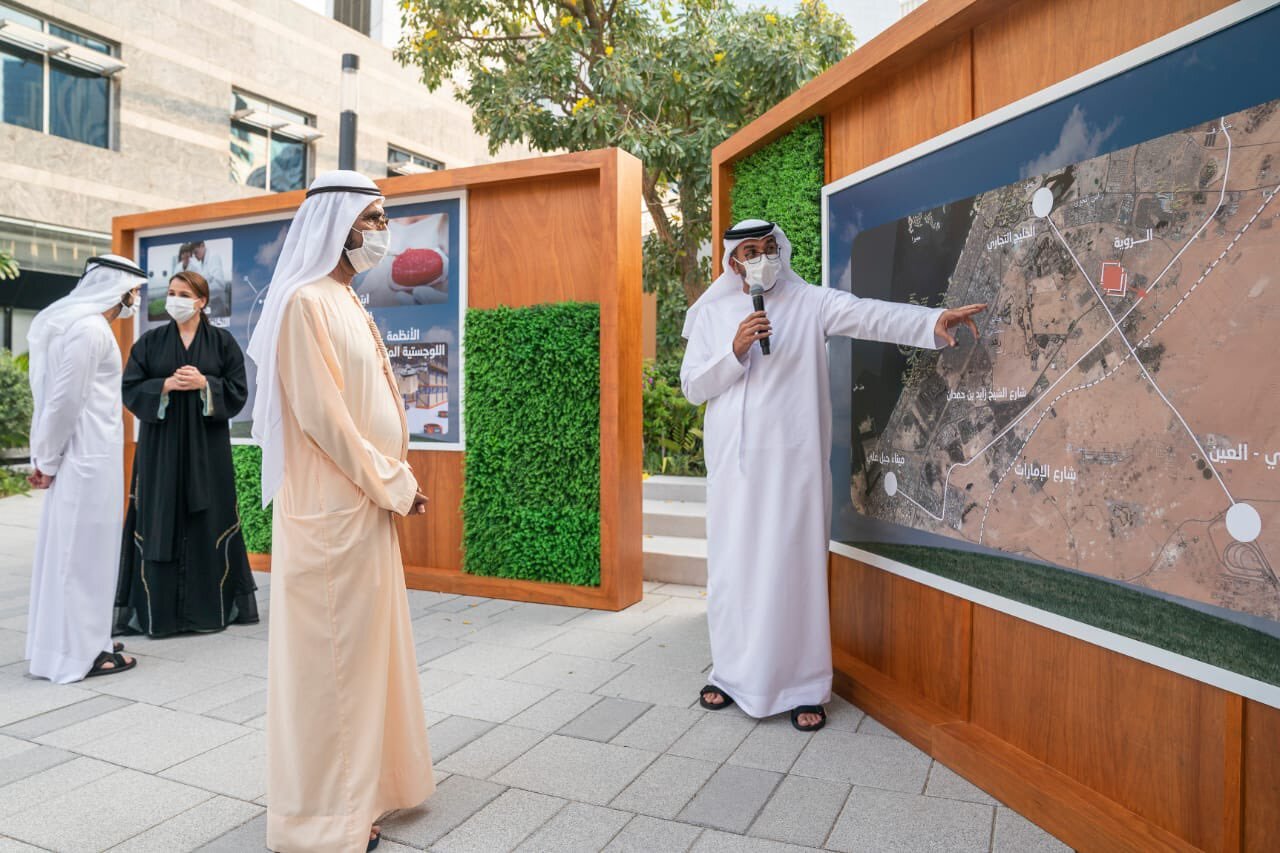
Image of HH Sheikh Mohammed at the launch of the Dubai Food Tech Valley, sourced from HH Sheikh Mohammed.
Moreover, individuals and organizations can be a part of the Food Tech Valley and support this vision. “The Food Tech Valley will offer an unprecedented array of opportunities for entrepreneurs, startups and small and medium size enterprises (SMEs), as well as larger established national and multinational food and agricultural companies wanting to set up operations in a dynamic new AgTech hub. The Food Tech Valley welcomes local and foreign direct investments in promising projects that can play a role in diversifying the national economy, develop the supply chain and logistic services, and assist in increasing the food and beverage investments in the UAE.”
Empowering Agricultural Sustainability
In Dubai, sustainability is always at the forefront of every conversation. Dubai’s new Food Tech Valley is no exception. H.E. The Minister of State for Food and Water Security builds on the UN’s Development Goals by sharing how the UAE Government will balance the carbon footprint of different farming methods with their impact. “The Food Tech Valley project aims to be a significant disruptor for traditional food systems through its emphasis on sustainability, low GHG emission and resource conservation. It intends to set the pace for a paradigmatic transformation of the UAE’s food system by being an incubator for Controlled Environment Agriculture Systems (CEA’s), such as indoor and vertical farms.”
Her vision for an ideal food system involves the “provision of sufficient quantities of food for the projected ten billion people that will be living on Earth by 2050,” in a fashion that is “sustainable and energy-conserving.” She adds that “it has to minimise greenhouse gas emissions, and it has to protect livelihoods, create jobs and promote gender equality. A sustainable food system must also provide the requirement for balanced healthy diets as well as sustainable biosecurity in order to create socio-environmental benefits.”
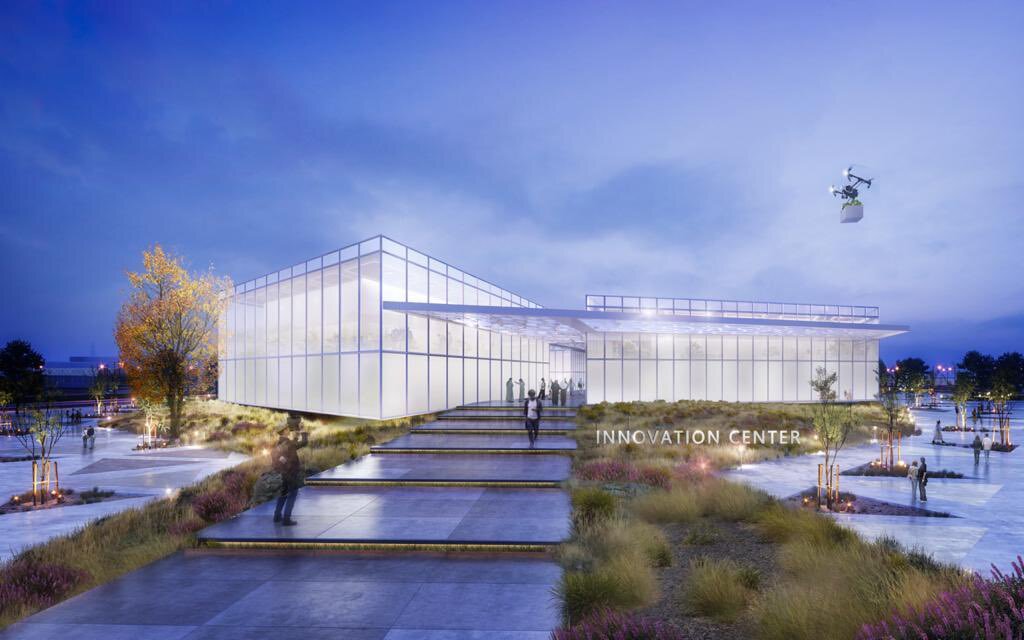
Rendering of the Food Tech Valley sourced from HH Sheikh Mohammed
While “this may sound like a tall order, modern technology-enabled food ecosystems have the capacity to meet these differing requirements. Increasingly, these facilities are utilising solar energy for their power, including for desalination and water recycling, giving them a lower carbon footprint than traditional systems.”
Her Excellency Mariam Bint Mohammed Saeed Hareb Almheiri shares how she believes the UAE can work with other gulf countries to build a resilient food system. “The UAE is committed to working with neighbouring countries to pool our respective knowledge and resources to improve food security for all. The GCC Food Security Network, of which the UAE is a founding member, was formed at the height of the coronavirus pandemic in recognition that countries in the Gulf region face the same challenges - both in the long term, with more than 95% of land on the Arabian Peninsula subject to desertification, and also in the immediate term, with the global pandemic significantly impacting GCC food supply chains. It is through the creation of such strategic partnerships to share knowledge, expertise and resources that GCC member states are working together to ensure food security for all.”
What Does Dubai Have In Store For The Future
From the very beginning, Dubai has been open-minded to change and growth. Henry Gordon-Smith highlights what this encouraging step towards change means for Dubai’s food security and development. “The Food Tech Valley represents an exciting milestone for the UAE. I believe it is the beginning of a new model for shared resources in food and AgTech for the entire region to be followed and built upon. I had the honour of participating in a U.S. Food Security Mission in the UAE which included a workshop focused on the Food Tech Valley, and I can say that it has the potential to be a true innovation catalyst in the UAE and beyond.”
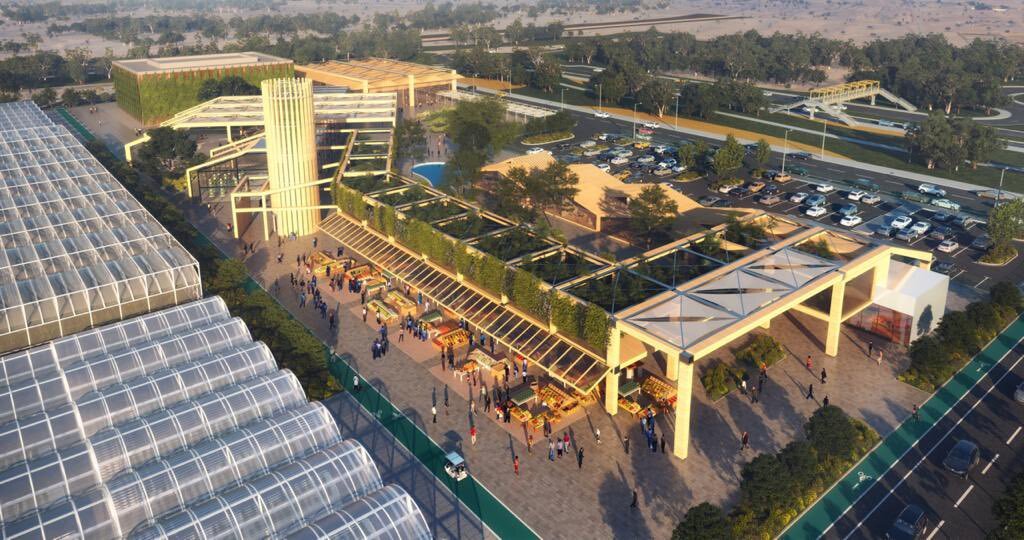
Rendering of the Food Tech Valley sourced from HH Sheikh Mohammed
Her Excellency Mariam Bint Mohammed Saeed Hareb Almheiri, Minister of State for Food and Water Security, builds upon this by sharing her vision for what the food & agriculture industry will look like in the UAE 10 years from now. “I see the UAE reaping the benefits of the AgTech seeds it has sown over the past few years, seeds that will bear fruit over the next decade with a growing landscape of food production facilities that bring forth bountiful crops and nutritious fish from the heart of the desert. I predict that the work we have done to foster the right environment for AgTech to take root in the UAE will see us well on the way to being a global leader in innovation-driven food security by 2051 and enabling us to increasingly share the advances we have made with other countries to assist them with their own food security agendas.
She adds that “one exciting new direction that may take root in the coming decade is the move from citizens being consumers to ‘prosumers’ by producing food in their own homes. This approach was seen in the Food and Water Security Office’s FoodTech Challenge, a 14-month-long contest that concluded in November last year and one that had a focus on community and home-based food solutions. Not only does this novel approach bring food production directly to the table, eliminating energy-consuming supply chains completely, it inculcates a greater appreciation of the value of food, which is ultimately what will ensure the success of our food system transformation.”
“The UAE is proud to be a pioneer on this important path and to lead the way in delivering the latest technologies in innovation-based food security. ”


